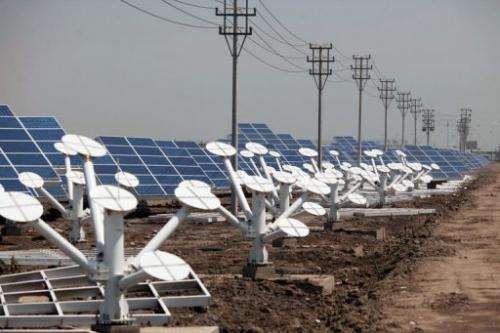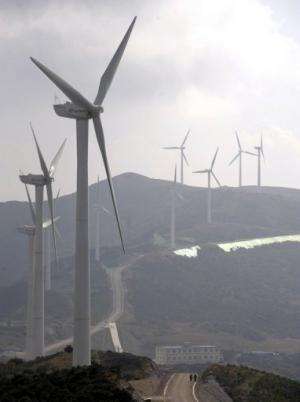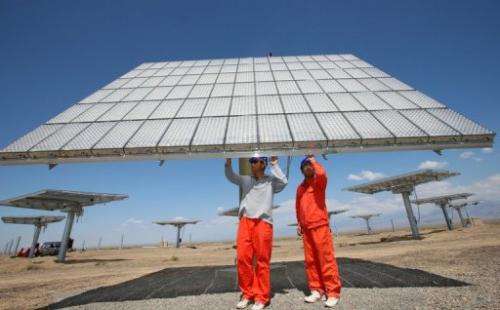China becoming global climate change leader, study says

China is rapidly assuming a global leadership role on climate change alongside the United States, a new study said Monday, but it warned greenhouse gas emissions worldwide continue to rise strongly. The report by the independent Australian-based Climate Commission, "The Critical Decade: International Action on Climate Change" presents an overview of action in the last nine months.
It was released on the same day as a fresh round of UN talks were to start in Bonn on boosting action on climate change—a two-decade-long process that has been dogged by procedural bickering and defence of national interests.
The study found that every major economy had policies in place to tackle the issue, but China was at the forefront in strengthening its response, "taking ambitious strides to add renewable energy to its mix".
"China is accelerating action," said Tim Flannery, the co-author and a key figure at the Climate Commission, which brings together internationally-renowned scientists, as well as policy and business leaders.
"China has halved its growth in electricity demand, dramatically increased its renewable energy capacity, and decelerated its emissions growth more quickly than expected.
"After years of strong growth in coal use, this has begun to level off. They are beginning to put in place seven emissions trading schemes that will cover quarter of a billion people," he said.
The report added that China, which this month agreed to work with the US to tackle global warming, wanted "to position themselves as the world's renewable energy leader".

"Whatever the reason, the results speak for themselves. China is quickly moving to the top of the leader board on climate change," said Flannery.
The report found that in 2012 alone China invested US$65.1 billion in clean energy, 20 percent more than in 2011. This was unmatched and represented 30 percent of the entire G20 nations' investment last year.
It pointed to new solar power capacity in China expanding 75 percent last year while the amount of electricity generated from wind in 2012 was 36 percent higher than 2011.
The United States, which with China produces some 37 percent of world emissions, also significantly strengthened its climate change response, pumping US$35.6 billion into renewable energy last year, second only to Beijing.
The report said the impact of the economic downturn and a progressive shift from coal to gas had kept Washington on track to meet its national goal of reducing emissions by 17 percent on 2005 levels by 2020.
"Important foundations have been set that are likely to have a lasting impact in the coming decades," it added, pointing to California, the world's ninth largest economy, beginning an emissions trading scheme in January.

More than half of US states now have policies to encourage renewable energy.
Beyond China and the US, momentum globally has grown with 98 countries committing to limit emissions.
"Renewable energy is surging globally with solar capacity increasing 42 percent and wind 21 percent in just one year," said Flannery. "With so much global momentum this is clearly the beginning of the clean energy era."
But while progress was being made, the report cautioned that "it is not enough".
"Globally emissions are continuing to rise strongly, posing serious risks for our society," it said.
"This decade must set the foundations to reduce emissions rapidly to nearly zero by 2050. The earlier such action is under way the less disruptive and costly it will be."
The five-day Bonn negotiations beginning Monday are the first since United Nations talks in Qatar last December that set down a two-track process for tackling greenhouse gases.
The goal is a new climate treaty that will be concluded by 2015 and take effect by 2020. Countries would also pledge greater commitment on tackling the carbon problem in the interim years before 2020.
(c) 2013 AFP



















